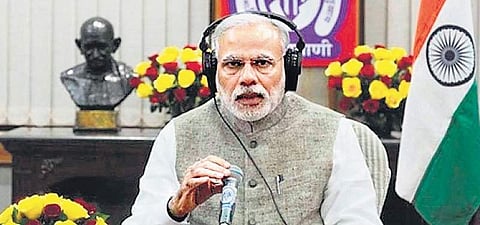PM Modi takes centralisation of powers to new heights
CHENNAI: Prime minister Narendra Modi is a big fan of smartphone apps. The Swachhata app, through which citizens can register complaints regarding sanitation issues, was one of the many smartphone apps that was launched by his government. The front end of the app is simple - one can lodge complaints on things, say like uncleared garbage, and get it redressed. But if one looks at the back end of the app, it lays bare how the union government in the last five years has intruded into the domains of the State and municipal governments through things as innocuous as algorithms of smartphone apps, political observers say. Let's see how.
The Swachhata app was indeed helpful for the common people. But what is invisible to the eyes is that all the complaints raised in the app would be routed through the Union Ministry of Housing and Urban Affairs. The union ministry holds the local municipal corporation officials accountable for addressing the sanitation issues.
It is good that the common people may get the garbage in their street cleared, but that the union government is getting involved in sanitation, a domain of the state government as per the Constitution, altered the very basic structure of governance followed since Independence, it is pointed out. What is under threat are the powers enjoyed by state governments and whether the state governments – which are much closer to the people and reflect the popular sentiments better than the union government - are losing their hold on domains granted to it by the Constitution. Since the Indira Gandhi’s regime, it was under Modi’s rule that the urge to centralise powers at New Delhi – starting from sanitation to education – was keenly felt.
Almost every non- BJP chief minister had raised concerns over the Centre encroaching on the powers of the state governments. In Tamil Nadu, the most talked about episode was Governor Banwarilal Purohit’s visits across the State, collecting petitions from people and his direct meetings with state government officials. Governors, being representatives of the union government, are just a figurehead of the State. But when faced with criticisms for intruding into the realm of the State government, the Raj Bhavan (Governor’s residence and office) released a legal opinion which claimed that the Governor has all powers that state ministers have.
It was not just Governor Purohit in Tamil Nadu, even Prime Minister Narendra Modi directly held meetings with District Magistrates in a few States, clearly bypassing the chief ministers of those states, observers say. Defence Minster Nirmala Sitharaman also held a review meeting with district collectors in Tamil Nadu - things that never took place during the rule of J Jayalalithaa a or M Karunanidhi. The Central government’s involvement in domains of state governments was not just tokenism in terms of union minister directly interacting with the bureaucracy in the States. Under the Smart City scheme, all the major infrastructure projects in the cities were tightly regulated by the Central government in the form of norms it set for the state governments to avail the funds. Though the state governments also contributed funds for the infrastructure projects under the Smart City scheme, the decision making power was skewed in favour of the union government.
The most far-reaching impact was on the finances of the state governments. Introduction of Goods and Services Taxes, among other things, had taken away the powers of the state governments in collecting taxes and had made them highly dependent on the union government for funds. The commanding position the union government achieved in terms of control over the public funds was evident when Prime Minister Modi declared in a public meeting in October 2017 that the union government will not release funds to those States that are “against development”.
Modi had often stressed on “cooperative federalism” when talking about relations between the Centre and States. But when state governments were told to follow the instructions of the Centre, the state governments in turn did not get much. The refusal of the Central government to exempt Tamil Nadu from National Entrance and Eligibility Test (NEET), despite the unanimous resolution passed by the state assembly, is an example.

